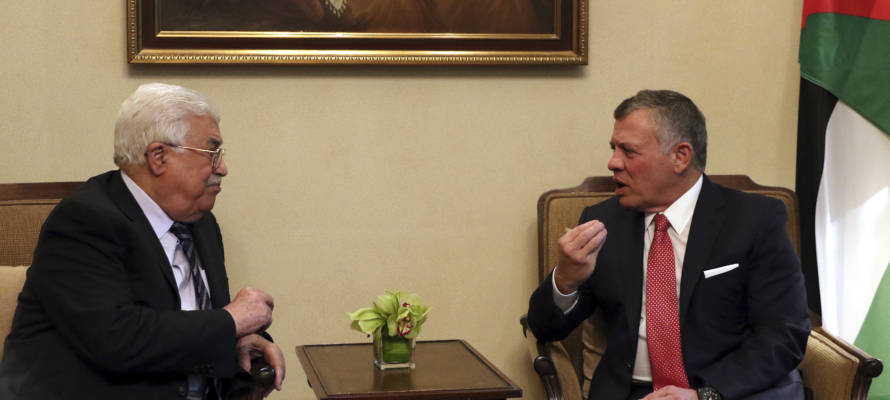The Palestinians and Jordan are “showing weakness” and “busy taking themselves hostage” with their reactions to the Israeli move, says former top-level adviser David Wurmser.
By Ariel Ben Solomon, JNS
With Israeli Prime Minister Benjamin Netanyahu pushing ahead with plans to apply sovereignty to the Jordan Valley and parts of Judea and Samaria, there are concerns being raised that it could ignite tensions with the Palestinians and neighboring Jordanians. Both outcomes are extremely unlikely, however, according to former senior U.S. officials with vast experience in the Middle East.
“Both the Palestinians and Jordanians are showing weakness and instead of threatening Israel with something it cares about, they are busy taking themselves hostage,” said David Wurmser, who served as a senior adviser on the Middle East to former Vice President Dick Cheney and is currently an executive at the Dephi Global Analysis Group, which he founded.
Palestinian Authority leader Mahmoud Abbas threatened last month to cut ties with Israel, stop security cooperation and void past agreements if Israeli Prime Minister Benjamin Netanyahu continues with his plan to apply Israeli law. Similarly, in an interview with the German magazine Der Spiegel in May, Jordan’s King Abdullah warned Israel that violence could erupt if it continues with its sovereignty plan.
“What would happen if the Palestinian National Authority collapsed? There would be more chaos and extremism in the region. If Israel really annexed [Jewish communities Judea and Samaria] in July, it would lead to a massive conflict with the Hashemite Kingdom of Jordan,” Abdullah said, according to an AP report.
Wurmser explains that Arab leaders will often inflate their own value by warning that their populations will turn to chaos and violence should they lose power. And while there may indeed be chaos, he suggests the P.A. and the Jordanian regime need Israel and the United States much more than the other way around.
“The Jordanian leadership thinks it can buy quiet by yelling at Israel and letting its radicals blow off steam, but like in the past when it appeased radical forces, they [the Jordanians] will again turn to the U.S. and Israel to save them,” said Wurmser.
If Jordan is going to condone radical anti-Israel forces and anchor its regime in appeasement of its large Palestinian population rather than its traditional national interest—namely, the preservation of a minority Hashemite regime backed by the Bedouin tribes—then it could lose its value from Israel’s point of view.
Wurmser noted that Jordan’s value as an ally is its ability to serve as a buffer and area of stability in a tumultuous region. But if Jordan abandons this historically rooted role, he said, that could “force a rethink” by Israel and the United States regarding the value of the relationship.
He adds that the P.A. is in a similar situation and has little to gain by inciting its populist base against Israel.
‘Entirely Dependent’
“The P.A. is entirely dependent on its cooperation with Israel to survive. We saw how long the P.A. lasted in Gaza before Hamas took over,” he said.
According to Harold Rhode, a longtime former adviser on Islamic affairs within the U.S. Defense Department’s Office of Net Assessment, Abbas’s threat to cut off security cooperation and end agreements with Israel is empty since it is in Abbas’s and other senior Palestinian officials’ interest to continue the cooperation.
“History shows us that this is almost assuredly just bluster,” Rhode said, calling Abbas’s rhetoric the “hold me back or I’ll commit suicide strategy.”
He also notes that Abbas and other Arab leaders also say one thing to their constituents, who they have continuously taught to despise Israel, while taking a different tone when speaking to diplomats including their Israeli counterparts.
“Past history shows us that whatever they say in public, they will most likely find a way to cooperate in private,” said Rhode. “Abbas and other senior officials are running a racket and the money for the Palestinians is going straight to their own foreign bank accounts, so they have the most to lose.”
According to Rhode, Abbas’s repeated threats trigger the same response each time “by the Western intelligentsia and the left-wing defense establishment in Israel,” which “are always taking his threats seriously despite the fact that it never happens.”
Rhode says the reason they fall for the Palestinian leader’s bluff is that they do not understand Arab culture, which puts supreme value on personal honor and status, on the importance of family and clan over the greater good. Abbas knows that if he ends security cooperation with Israel “he is finished,” said Rhode.
‘The Arabs are Sick and Tired’
Hillel Frisch, a professor of Middle East studies at Bar-Ilan University in Ramat Gan and a senior research associate at the Begin-Sadat Center for Strategic Studies, predicts that the P.A. will maintain security cooperation in order to protect its own interests.
“The P.A. may not rescue Israelis that stray into its territory, or may promote violence with regard to the Temple Mount, but it will keep up the cooperation in monitoring and apprehending Hamas and Islamic Jihad terrorists,” he said.
Warnings from the P.A., Arab leaders and even Western leaders regarding the planned application of Israeli law in Judea and Samaria ring similar to the doomsday scenarios that were proclaimed prior to the Trump administration’s transfer of the U.S. embassy to Jerusalem. The same rhetoric was also heard leading up to the annexation of the Golan Heights with U.S. support. Nothing happened in either case.
In particular, many opponents of Israel’s upcoming move warn that applying sovereignty over parts of Judea and Samaria will negatively affect Israel’s improving relations with much of the Arab world. Yet, Rhode suggests Israel’s relations with Gulf States will continue to improve, while Palestinians are losing standing in the Arab world due to their never-ending conflict with a Jewish state they have no hopes of defeating.
“The Arabs are sick and tired of the Palestinians,” said Rhode.
Such sentiments are being expressed openly throughout the Arab world. A Saudi writer recently told BBC Arabic in a May interview that the Saudi public no longer cares about the Palestinian cause.
Abdulhameed Al-Ghobain said the Palestinians “have lost,” and that the Saudis care about their national, strategic and economic interests, which can all benefit from establishing relations with Israel.
“The Arab League issues statements that are worthless. We should deal with reality. The relations [with Israel] have gone beyond normalization,” said Al-Ghobain. “The relations have become warm. It is no longer just about normalization. The relations have reached a very warm level.”
As to the predicted outcome of Israel’s sovereignty move, Wurmser said that “a resolution of the conflict or a Palestinian state are nowhere to be seen and any violence by the Palestinians will—like in the past—backfire and leave Israel in an even better position.”
MAKE THE LAND OF ISRAEL EVEN MORE BEAUTIFUL!
PLANT YOUR VERY OWN FRUIT TREES IN ISRAEL!
Farmers near the Gaza border lost family, friends and workers. Spring is here, and they desperately need help to replant the farms. Join us in blessing the People and Land of Israel.
“I will ordain My blessing for you…” (Leviticus 25:4)



